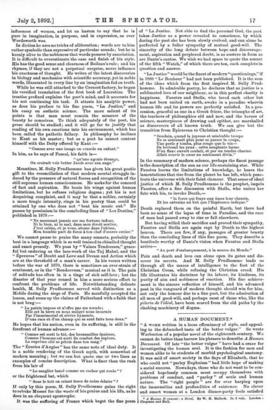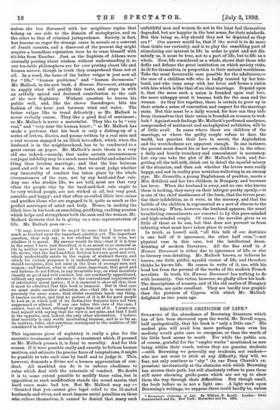A HUMAN DOCUMENT.*
"A WORK written in a loose effeminacy of style, and appeal- ing to the debauched taste of the better vulgar." So wrote Warburton of a popular novel of the eighteenth century. We cannot do better than borrow his phrases to describe A Human Document. Of late "the better vulgar " have had a craze for investigating the human soul. It is the fashion for men and women alike to be students of morbid psychological anatomy. It was said of smart society in the days of Elizabeth, that he who could not "parley Euphuism" had little hope of making a social success. Nowadays, those who do not want to be con- sidered hopelessly common must occupy themselves with problems of conduct, and " parley " of souls and human nature. The "right people" are for ever harping upon the immensities and profundities of existence. No clever and smart woman at a London dinner-party feels satisfied • A Human D.cumen‘ : a Novel. By W. H. Hallo*. In Svola. London: Chapman and Hall.
unless she has discussed with her neighbour topics that belong on one side to the domain of metaphysics, and on the other to that of criminal jurisprudence. Society, in fact, has become as eager for strange cases in morals as a convent of Jesuit casuists, and a diner-out of the present day might acquire a boundless reputation were he to cram himself with tit-bits from Escobar. Just as the Sophists of Athens were eternally prating about wisdom without understanding it, so our tea-table philosophers are for ever prating about life and human nature, though in truth they comprehend them not at all. In a word, the taste of the better vulgar is just now all for "life," "human problems," and "human documents."
Mr. Mallock, in his new book, A Human Document, attempts to supply what will gratify this taste, and steps in with an artfully spiced and doctored contribution to the cult of the new Sophistry. Without question he knows his public well, and, like the clever linendraper, hits the fashion of the hour just between wind and water. The better vulgar like to tread delicately ; so Mr. Mallock is never verbally coarse. They like a good deal of sentiment ; so Mr. Mallock is never a materialist. They like to be "very real," and very near the human heart ; " so Mr. Mallock has made a pretence that his book is only a dishing-up of a
series of letters, diaries, and poems written by a real man and a real woman engaged in an illicit love-affair, which, when the
husband is in the neighbourhood, has to be conducted to a great extent on paper. Mr. Mallock's main thesis is a very old one indeed,—namely, that under certain circumstances conjugal infidelity may be a much more beautiful and admirable thing than loveless marriage ; and that the line between good and evil is so fine a one, that we must judge whether any immorality of conduct has taken place by the whole circumstances of the case, not by any hard-and-fast rule. Any one who studies life, we are told, must see that very often the people who by the hard-and-fast rule ought to be very wicked people, are not wicked at all, but very good, amiable, and happy ; and that often so-called illicit love raises and purifies those who are engaged in it, quite as much as the perfect marriages of mind and body. Hence, in making the illicit love in his book an ennobling, purifying, exalting passion which helps and strengthens both the man and the woman, Mr. Mallock declares that he is giving us a true representation of life. Mr. Mallock goes on
" It may, however, still be urged by some that I have not so much as touched upon the important question yet. The important question, they may say, is not whether the book is true, but whether it is moral. My answer would be this—that if it is true in the sense I have just described, it is as moral or as immoral as life is, neither more nor less. If it is immoral to show, as actual life shows, that the hard-and-fast division between good and evil, which undoubtedly exists in the region of abstract theory, and which for certain purposes it is undoubtedly necessary that we should recognise, does not exist in the lives of average men and women; and farther, what is still more important, that good and evil fortune do not follow, in any invariable way, on what moralists classify as good and evil conduct, but are constantly apportioned, without any apparent reference to the conventional requirements of retributive moral justice; if it is immoral to show all this, then it must be admitted that this book is immoral. But in that case we must make another admission also—that life is immoral in precisely the same sense ; that whilst moralists teach one thing, it teaches another, and that no picture of it is fit for good people to look at, in which half of its distinctive features have not been suppressed or altered. If any one takes this view of the case, I cannot, here at least, attempt to argue him out of it. I must con- tent myself with saying that the view is not mine, and that I hold to the opposite, and, indeed, the only other alternative. I believe that morality is only worth inculcating because, and in so far as, its motives, rules, and sanctions correspond to the realities of life considered in its entirety."
This ingenious piece of sophistry is really a plea for the casuistic treatment of morals,—a treatment which, if pressed as Mr. Mallock presses it, is fatal to morality. And for this reason. If it were possible really and exactly to fathom human motives, and estimate the precise force of temptations, it might be possible to take each case by itself and to judge it. This, however, demands a divine not a human appreciation of con- duct. All mankind can do is to enforce obedience to rules which deal with the externals of conduct. No doubt it is to some extent possible to modify these rules, but in opposition to such modification stands the sound maxim that hard cases make bad law. But Mr. Mallock may say :— Granted that you cannot give legal relief to the ill-mated husbands and wives, and must impose social penalties on those who relieve themselves, it cannot be denied that many such unfaithful men and women do not in the least feel themselves degraded, but are happier in the best sense, for their misdeeds. But this being so, why should they not be depicted as they are P' Our answer would be, that if the novel is to do more than tickle our curiosity, and is to play the ennobling part of stimulating our interest in life in order to quiet and not dis- satisfy us, it must be true, not to a part of life, but to life as a whole. Now, life considered as a whole, shows that those who defile and defame the great institution on which society rests, do ill for themselves, in proportion to their natural worthiness. Take the most favourable case possible for the adulterers,— the case of a childless wife who is badly treated by her hus- band, and who runs away with her lover and forms a union with him which is like that of an ideal marriage. Depend upon it, that the more such a union is founded upon real love, the more unhappy must it become both for the man and the woman. As they live together, there is certain to grow up in their minds a sense of veneration and respect for the marriage state. But this must be a daily wound, for how can they hide from themselves that their union is founded on treason to wed- lock ? Against such feelings Mr. Mallock's perfumed anodynes, compounded of sentiment and metaphysical subtleties, will be of little avail. In cases where there are children of the marriage, or where the guilty couple refuse to dare the world, but practise their love in secret, the degradation and the wretchedness are apparent enough. In one instance, the parent must desert his or her own children ; in the other, a daily and hourly treachery and concealment is necessary. Let any one take the plot of Mr. Mallock's book, and for- getting all the tall-talk, think out in detail the squalid misery of the situation, and then ask whether the lovers were really happy, and not in reality poor wretches wallowing in an uneasy stye. Mr. Grenville, a young Englishman of position, meets a Mrs. Schilizzi and her two children in Hungary, and becomes her lover. When the husband is away, and no one who knows them is looking, they carry on their intrigue pretty openly,—it is one of the chief nastinesses of the book, that the lovers prac- tise their infidelities, as it were, in the nursery, and that the babble of the children is represented as a sort of chorus to the love-making. When, however, the husband appears, the usual humiliating concealments are resorted to by this pure-minded and high-minded couple. Of courso the novelist gives us as little of these as he can, but that does not prevent us from inferring what must have taken place in reality.
In truth, as Lowell said, "all this talk of our destinies is one half of it ignorance, the other half rum,"—not physical rum in this ease, but the intellectual dram- drinking of modern literature. All the fine stuff in A Human Document is either due to ignorance of life, or else to literary rum-drinking. Mr. Mallock knows, or believes he knows, one little pitiful, squalid corner of life, and therefore thinks he knows life. He comes to write of it, too, with his head hot from the perusal of the works of the modern French novelists. In truth, his Human Document has nothing to do with humanity. One virtue, however, we gladly allow his book. The descriptions of scenery, and of the old castles of Hungary and Styria, are quite excellent. They are hardly less graphic than the pictures of Cyprus with which Mr. Mallock delighted us two years ago.











































 Previous page
Previous page